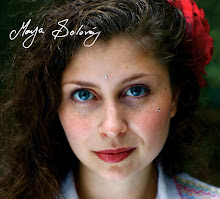

What do you do when it's 2:00am, you're at a raging party, everyone's dressed up in masks and wild costumes, is engrossed in dancing and making out, and you're about to go on and play a set.
Now say you're not a full rockin band, but instead one lone singer-songwriter. (Not like I'm naming any names here). It's a room of at least 50-100 people in all sorts of altered states, and somehow, they have to listen to you.
Well.
First order of business...
Fake an orgasm. Loudly.
Believe me. It rattles a little attention. I mean let's face it. The way things are going on that dance floor, that's the direction everyone's heading anyway. And maybe they'll be too drunk to actually get there, so be a sport, and do your part.
Maybe you'll want to make a few more odd sounds in general during your set. Like strange gutteral sounds or african tribal mating calls. Maybe you curse a little more. 2am's a rowdy time, and you do what you gotta do. In other words, why stand in a tub of water with shoes on? Sometimes you just gotta get in.
As for the actual set- It really don't matter. Mess up the words, make new melodies, just as long as it grooves like a motherf*cker. Peeps don't care, they just want to feel their bodies beat to something.
Finally- make it short. Attention spans aren't that long in general, let alone in a situation like that. Better to be encored for more than lose that precious thread of attention.
Speaking of which, I'll follow my own advice and sign off on this one for now.
;)








